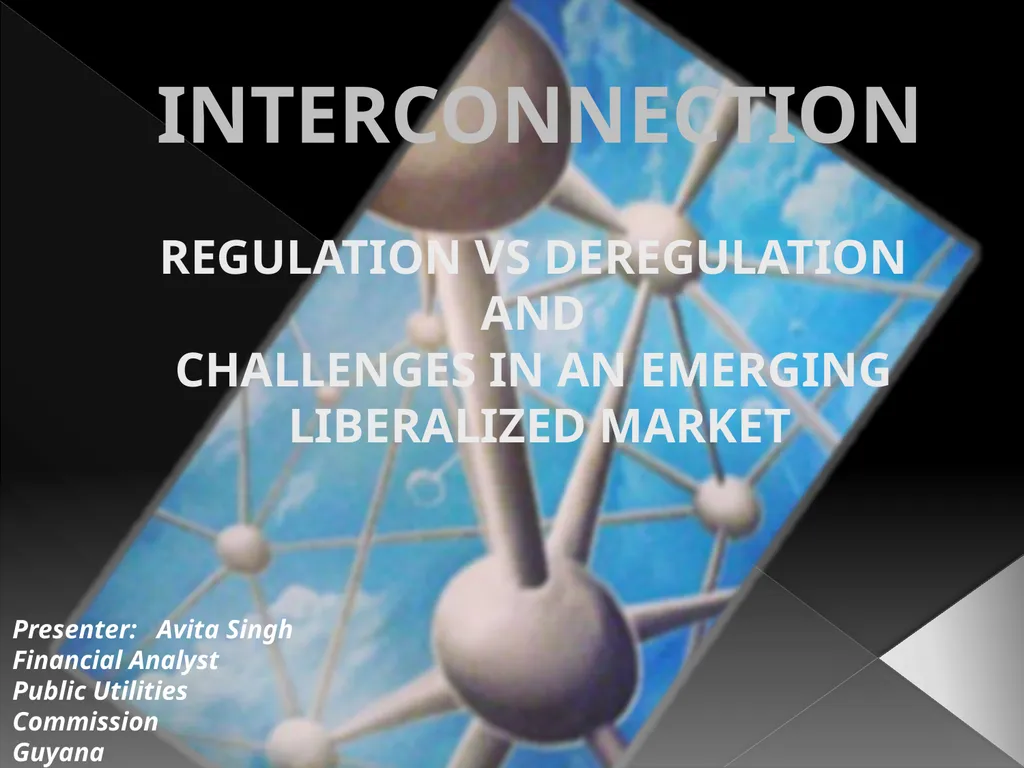INTERCONNECTION REGULATION VS DEREGULATION AND
Author : tatyana-admore | Published Date : 2025-05-24
Description: INTERCONNECTION REGULATION VS DEREGULATION AND CHALLENGES IN AN EMERGING LIBERALIZED MARKET Presenter Avita Singh Financial Analyst Public Utilities Commission Guyana TOPICS Definition of Interconnection Why Interconnection is necessary
Presentation Embed Code
Download Presentation
Download
Presentation The PPT/PDF document
"INTERCONNECTION REGULATION VS DEREGULATION AND" is the property of its rightful owner.
Permission is granted to download and print the materials on this website for personal, non-commercial use only,
and to display it on your personal computer provided you do not modify the materials and that you retain all
copyright notices contained in the materials. By downloading content from our website, you accept the terms of
this agreement.
Transcript:INTERCONNECTION REGULATION VS DEREGULATION AND:
INTERCONNECTION REGULATION VS DEREGULATION AND CHALLENGES IN AN EMERGING LIBERALIZED MARKET Presenter: Avita Singh Financial Analyst Public Utilities Commission Guyana TOPICS: Definition of Interconnection Why Interconnection is necessary Why Regulate Interconnection What is a Good Interconnection Regime Issues that should be dealt with in an Interconnection Agreement Approaches to Interconnection Rates Regulation Liberalization of the Telecoms sector in Guyana WHAT IS INTERCONNECTION? “Linking with suppliers, providing public telecommunications transport networks or services in order to allow the users of one supplier to communicate with users of another supplier and to access services provided by another supplier…” (Reference:- World Trade Organization) WHY INTERCONNECT? Interconnection increases the value of a network to its subscribers’ by increasing the number of people they can call and the range of ICT services they can access. Interconnection increases the value of telecommunications services, or the range of services operators can provide, thereby increasing profitability. Allows for expansion or improvement in services that are valuable to customers. WHY REGULATE INTERCONNECTION? 1. To protect competition Safeguard against anti-competitive conduct Safeguard against emergence of market structure not conducive to effective competition 2. To achieve some social objective Universal service not achievable through market forces alone WHY REGULATE INTERCONNECTION? 3. To manage scare resources Radio spectrum Telecommunications numbers 4. To ensure compatibility and interoperability between telecommunications systems and to avoid interference and safety hazard 5. Each operator holds a monopoly for termination on its network. WHY REGULATE INTERCONNECTION? In some circumstances telecommunications operators will interconnect voluntarily. However, sometimes incumbent operators will have little incentive to allow access to their network, and may seek to limit competition and preserve its market power by: Refusing to interconnect Offering interconnection at a price, or on other terms, that make it difficult for an efficient entrant to compete, or Seeking to “sabotage” the entrant by providing a lower quality interconnection service to the entrant than the incumbent provides itself. WHAT IS A GOOD INTERCONNECTION REGIME? What is an Interconnection Agreement? “The commercial and technical arrangements under which service providers connect their equipment, networks and services to enable customers to have access to the customers, services and networks of other service providers.” (Reference:- International Telecommunications Union) ISSUES THAT SHOULD BE DEALT WITH IN AN INTERCONNECTION AGREEMENT Prices and adjustment of price over time Points of interconnection Transport (conveyance) charges and traffic routing Quality of service standards Billing and collection Traffic measurement and settlement Numbering resources














